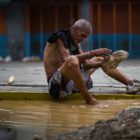In one on one interviews they talk about their lives and the challenges they and their families face
Venezuelans today are torn at every level. Between two current Presidents, two current Parliaments, two socialist rulers over 20 years, first with the popular Hugo Chavez and today the unpopular Nicolas Maduro.
Two decades of noose-tightening by the U.S. to topple the socialist reign sitting on the largest oil reserves in the world have succeeded in isolating Venezuela from even its staunchest supporters and eroded its main source of revenue, oil. The country that was once flush with cash is now broke and importing gasoline. Venezuelans have been dependent on imports for decades, now they can’t afford even the bare minimum daily needs such as food, medicine and clothing when available. Hyperinflation has rendered the currency worthless.
Today, two very different generations live side by side.
Older Venezuelans benefited from the country’s oil bonanza in the seventies through the nineties. They also witnessed their country’s transition from liberalism to hardcore socialism.




















